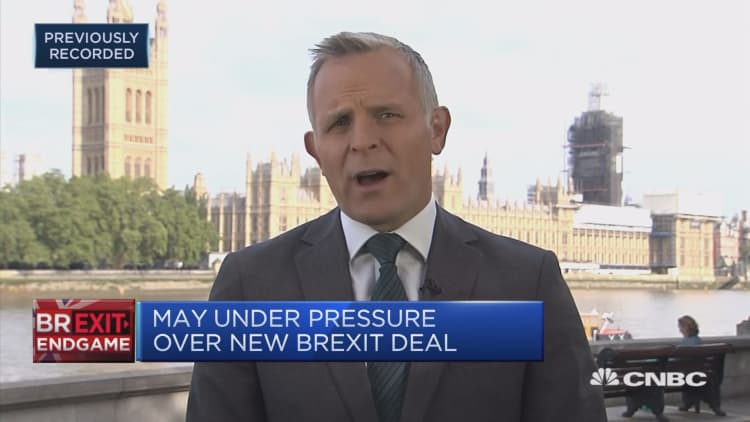British Prime Minister Theresa May could announce her resignation in the next few days, according to U.K. media reports, as she faces pressure from members of her own party to step down.
Downing Street appeared defiant however, with May's spokesman saying she will meet ministers this afternoon and that she was listening "to colleagues about their concerns on the (Withdrawal Agreement) bill," Reuters reported. He also said she was focused on delivering Brexit.
The Withdrawal Agreement Bill is seen as having precipitated the latest crisis in government with lawmakers widely opposing May's attempt to resurrect her Brexit deal that they've already rejected three times.
The Times newspaper reported on Thursday morning that May will announce that she will quit her post as early as Friday. The paper did not cite a source and Downing Street would not comment on the reports when contacted by CNBC.
May will remain as prime minister while her successor is elected in a two-stage process under which two final candidates face a ballot of 125,000 Conservative Party members, the newspaper said.
Pressure appears to have been mounting on the prime minister to announce her departure in the last 48 hours amid a backlash of her offer of a "new" Brexit plan that she wanted to put before Parliament.
Lawmakers have already rejected May's Brexit deal three times so the prospect of another vote on the withdrawal agreement, that many opposition and Tory lawmakers have already rejected and said had not changed much, was met with disbelief in many quarters.
On Wednesday night, the Telegraph's deputy political editor reported that the influential 1922 Committee (a powerful group of pro-Brexit Conservative party lawmakers) wanted May to announce on Friday that she will step down as party leader by June 10.
On Thursday, the Guardian newspaper reported that Geoffrey Clifton-Brown, the treasurer of the 1922 Committee, will allow a new no-confidence vote in May if she does not announce her resignation date Friday.
That would mean changing the rules from the status quo that a leader can only face one confidence vote within a 12-month period. May survived a confidence vote last December. A no-confidence vote would likely take place after Trump's state visit as Parliament will be in recess until June 4.
In the meantime, how much support May has from her remaining ministers is yet to be seen. She was dealt a blow Wednesday evening when senior minister Andrea Leadsom quit her post saying that May's new Brexit plan contained "elements I cannot support, that aren't Brexit."
The Telegraph newspaper reported Thursday that May "is under siege" in Downing Street and had refused to meet key ministers Jeremy Hunt and Sajid Javid but later reports suggested that Hunt is due to meet May later Thursday.
Hunt signaled he still backed May, however, telling a reporter that she would still be prime minister when Trump visits the U.K. on June 3. "Theresa May will be prime minister to welcome him and rightly so," he said, Reuters reported.
Clinging to power
The latest turmoil in the British political establishment comes after May said she had made a number of changes to the Brexit plan she had offered members of Parliament (MP) – including the offer of a vote on whether to hold a second referendum – but opposition Labour Party leader Jeremy Corbyn said he'd oppose the deal, as did other opposition parties, and significant Tory MPs opposed the plans too. May's proposal, formally known as the "Withdrawal Agreement Bill," certainly looks dead in the water now and is unlikely to be introduced, analysts noted.
The pound hovered around a four month lows as opposition to May's plan emerged Wednesday and slipped to $1.2625 overnight, its lowest since January 4.
May appears to be clinging on to power for now but analysts following the political situation say that her premiership "is finally coming to an end." Talk has also turned to who might replace May.

"Questions that remain to be settled include whether May will stay in place while the Tory Party chooses her successor; some ministers want David Lidington, her de-facto deputy, to act as caretaker prime minister, but May is expected to stay in place until her successor takes over," Mujtaba Rahman, managing director of Europe at Eurasia Group, said in a note Thursday.
A favorite to replace May is Brexiteer Boris Johnson, and Rahman said he was likely to attract support from the Conservative Party.
"Without launching a campaign — by his own standards, Boris has been lying low — he has momentum ... Even mainstream Tories are coming round to the idea of PM Johnson," Rahman said, though he added Johnson could face pressure not to go for a no-deal Brexit if he gets into power.
"He is likely to emphasize he would initially seek a deal, though one based on a revised Withdrawal Agreement with changes to the Irish backstop, to which the EU is unlikely to agree. Johnson will also come under pressure from Tory MPs not to seek a general election to secure a mandate for no-deal; many fear losing their own seats, and a Corbyn government."


